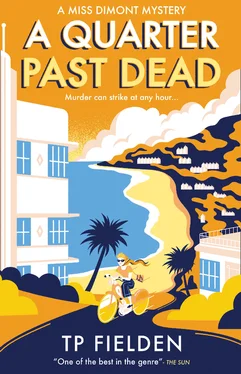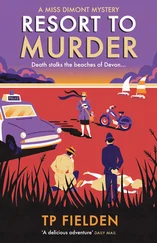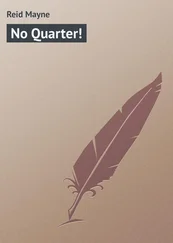‘The fancy piece? What did you call her – the courtesan?’
‘I was being polite. She’s the worst kind of advert for our gender you could ever imagine.’
‘Men seem to like her,’ said Auriol evenly, serving on to the plates, ‘a lot. By that I mean, a lot of men like her a lot .’
‘What I feel is that there’s something toxic about her – you could see that men might kill over her, however worthless she may be. Goodness, even Terry…!’
Auriol often heard complaints about Terry. Judy didn’t always mean what she said.
‘What interests me is this other woman, Rouchos,’ said Auriol, switching tack. ‘Clearly not the kind of person you’d normally find in a Buntorama. Disguised herself with her choice of clothes, but the jewellery gave her away, didn’t it? What the devil was she doing there? And more importantly, where was she when she wasn’t in the camp?’
Miss Dimont thought about this. ‘Bunton said she was a prostitute, but I don’t believe it. The clothes she left behind, the make-up, the perfume – all wrong for a woman in that line of business.’
Auriol arched an eyebrow. ‘And you’d know?’
‘I would assume ,’ added Judy quickly. ‘OK, she’s sitting on her bed fully dressed, she might have been waiting for a client, but when you think about it she hadn’t been seen around the place all week so she wasn’t using the chalet as a place of work. Why would she suddenly change tack?’
‘According to what you say, Bunton claimed she was going to the Marine Hotel to grab a client or two. Maybe she had a room there.’
‘What, a room in Buntorama and one in the Marine? Why on earth would she do that?’
‘I’d check,’ said Auriol with that sliver of authority which once had junior naval officers scurrying to make her a pot of tea, no sugar, two digestives.
‘I will. Now what about Does the Team Think? – it must almost be time.’
Auriol switched on the radio and they sat with a glass of wine listening to silly jokes from the mouths of Jimmy Edwards, Ted Ray and Arthur Askey, a world away from the sinister doings in Ruggleswick. Both were listening, both were laughing, but both were thinking at the same time.
However, as a rat-tat of audience applause signalled the end of the show, the conversation did not immediately return to murder but to another kind of death. On the wall above the bakelite wireless hung the same photograph each woman displayed in her home, a black-and-white portrait of a man they both had loved – Auriol as a sister, Miss Dimont as his fiancée.
‘Not his kind of humour,’ said Auriol, switching off the radio. ‘Coffee?’
‘I think he’d have enjoyed The Goon Show more.’
‘Yes, madcap. Like Johnny Ramensky.’
It was always painful steering the conversation round to Eric Hedley, almost like picking at a scab, but most times they did. Both bitterly felt his loss, his heroic sacrifice in the last days of war when really he could have been spared. Auriol and Judy were friends, but Eric was what made their friendship eternal.
‘Johnny was a terror.’
‘It’s why Eric adored him so much. And, Hugue, you have to admit, the neatest safe-cracker you ever came across.’
‘To be honest,’ said Miss Dimont, ‘I never knew that many men with a passion for gelignite.’
Back in the office Betty Featherstone was making up for time off prompted by the hair debacle. She was doing the early pages, her desk overflowing with scraps of paper sent in by correspondents with a greater passion for the minutiae of village life than Betty could ever muster.
But her mind was on the colossal sense of entitlement Dud Fensome seemed to have. What Dud wanted, Dud got. The green patches among the platinum were, after all, just the tip of the iceberg when it came to his demands.
She dithered for half-an-hour over the Ashburton Sheep Sale market report, with its complex, interwoven, arcane and utterly boring detail on greyface ewes, whiteface ewes, clun ewes, kerrys, hoggets, wether lambs and registered greyface lambs. To turn into readable prose the pencilled notes scribbled on the back of a sale bill – was that the poor sheep’s last drop of blood tainting the dispatch? – required more concentration than she could cope with at the end of a long day. She lifted the paper to one side but it stuck to her fingers, the blood not quite dry.
‘Ew!’ Betty squeaked, as John Ross strolled by.
‘Ay, lassie,’ growled the Glaswegian. ‘Ewes indeed – they got you on the early pages, eh? Try to get it right this week .’
‘I simply haven’t the energy,’ said Betty, thinking about cycling home to have another go at her hair.
The chief sub-editor leaned over and started shuffling through the confetti on her desk.
‘Good one here,’ he grunted, voice tinged with venom. ‘Women’s Institute announcing their new competition – “A SALAD FOR ONE.”
‘And look! The winner of last week’s lampshade-making contest! Gloooorious…’ he added bitterly. Once he’d been a football reporter on a Fleet Street newspaper, now he was reduced to inventing headlines for the pitiful scraps of information sent in from the far-flung extremities of the newspaper’s circulation area. Dispatches from places where reporters never trod.
‘Och!’ he said, shaking his ugly head at a missive written in block capitals, ‘WAR DECLARED ON THE RABBIT POPULATION.’
‘And this! “DRAMATIC RESCUE ON MUDFORD CLIFFS”,’ he intoned, adding with heavy irony, ‘“NOT MANY DEAD”.’
One more caught his jaded eye. ‘That old chestnut about no public lavs down at Bedlington. Again. Oh mother Mary, save me now!’
Once upon a time Ross would be consoling himself in the pub by this hour, but since he was sworn off the booze these days he took it out on anybody left in the office after opening-time.
‘You just don’t get the quality of local corr any more,’ he said, churning hopelessly through the paper mountain on Betty’s desk as if panning for gold. ‘The stupidity of the village correspondents. You ask them to give you a story and all they can come up with is – oh, Christ !’
Betty abruptly put down the hand-mirror. She’d given up typing and was inspecting her green and platinum stripes. ‘What is it, Mr Ross?’
‘Girrlie, girrlie, oh girrlie…’ he whispered as if he had struck the mother lode, ‘ye canna believe… look at this week’s Umbrella!’
This was not an invitation to step out into the rain but to scrutinise the cage-droppings of a chum of the editor, a man who once made a half-funny speech at Rotary and was immediately snapped up to do a weekly column.
This half-wit called his column ‘Between Ourselves’ and signed himself ‘Umbrella Man’. Nobody knew why.
‘What’s it about?’ said Betty listlessly.
‘Dog bowls in pubs,’ replied Ross, his voice hoarser than an undertaker’s.
‘Well, look,’ said Betty, trying to break the mood. ‘Just think, next week I’m off to meet Moomie. We’ll get something wonderful out of that!’
The chief sub looked at her suspiciously. ‘Mommie?’
‘No, Moomie – Moomie Etta-Shaw, the jazz singer. She’s doing the summer season at the Marine.’
‘Ay,’ said Ross. ‘I know who you mean now. She and Alma Cogan used to work together at the Blue Lagoon in Soho.’
‘Didn’t she start out as a cloakroom attendant?’ asked Betty, who’d been doing her homework.
‘Nah,’ said Ross caustically, walking away. ‘She only took people’s coats.’
If this was supposed to be a joke it went over Betty’s head and she returned to the fuss over the building of a bus shelter in Exbridge – nobody wanted it outside their house yet everyone agreed it was vital in winter to stop villagers being splashed by passing traffic. Betty’s fingers were flying, the copy-paper was emerging from the top of her machine, but you couldn’t call it writing.
Читать дальше












